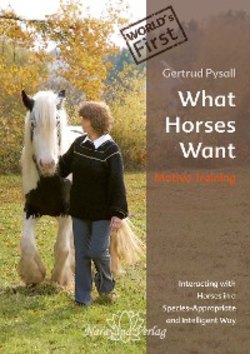Читать книгу What Horses Want - Gertrud Pysall - Страница 9
Preface
ОглавлениеI have been fascinated by horses from early childhood. I found them more captivating than any other animals. I watched every episode of Fury on TV and dreamed of a very close friendship and relationship with a horse. I had the unforgettable experience of sitting on the back of a pony, while being led twice around a family friend’s backyard. Going round once did not take much longer than a minute, but I will never forget it. It was heaven on earth, the epitome of joy – two rounds on a pony in a concrete yard. From then on, this indescribable feeling became my personal benchmark for happiness. Many years later, in the Eifel Region, I experienced something similar when I was allowed to ride through the village on a very broad draught horse without a saddle. I did not have any riding skills, just sat blissfully astride the animal. He just trotted along nicely, carrying me to his stable. (I did not realise at the time that this was not a safe thing to do, but I would not have cared anyway.) These two experiences formed my own image of horse riding and the relationship between humans and horses. In the 1950s, horse riding was an upper class privilege, and I decided to take riding lessons with the first money I would earn.
This is exactly what I did in 1969 in an equestrian centre in Idar-Oberstein. The typical groundwork lessons, that I used to look forward to immensely, were followed by riding lessons on school horses. And this was where disillusionment started to set in. I saw how unhappy these horses were. They attempted to bite and to kick; there were warning signs next to the boxes, telling us which horse we were not supposed to touch. I witnessed a couple of falls – my own and those of my fellow students – because riding instructors whipped the horses to encourage them to speed up.
The riding lessons were bad and so was the atmosphere. The post-lesson drinks seemed more important than anything else. Students and horses were shouted at. I could not learn anything under these circumstances and started to be more scared of riding, rather than feeling elated. When I changed jobs, I also changed equestrian centres. Full of hope, I started afresh, only to experience the same conditions and principles. I tried out one riding school in my neighbourhood after another but could never find what I was looking for: a respectful and dignified interaction between humans and horses. An interaction that would enable me to re-experience the feelings I could remember so well.
The only ray of hope was a private horse riding and holiday farm in Oberstaufen. At Schlippe Farm I was allowed to ride privately owned horses. It was not an “equestrian factory” and the Schlippe family treated the horses and me with love and respect. My hopes were restored and I spent all my holidays and days off at the stables – and learned how to ride.
Later on, I spent a few years living in Berlin. Riding was almost impossible there, and my dream of owning a horse in the countryside became stronger and stronger. I moved to the countryside, bought a horse from a holiday farm and imagined my dream had come true. Far from it. The horse was difficult and I did not know enough (I was a reasonably good rider, but that was it).
I built a large stall for the mare I called Hella. I thoroughly mucked out the stall every day, led her onto a field, provided her with a companion in the form of my friend Gunda’s horse, groomed her meticulously and gave her lots of cuddles. But she did not put her trust in me, not in the way I had imagined. For example, she never wanted to hack out with me and that made me think. If nothing I did was enough or I was not doing the right thing, what should I be doing? I wanted to know what horses want, what horses need to be happy and content. I was searching for the conditions that would allow me to experience with a horse what was anchored in my imagination: a deep sense of trust, harmonious mutual understanding, closeness that could be established and maintained without fear, stress or pain for either party. I had already felt it, I knew it was possible and I really wanted to find this feeling again.
I tried to find as much information as possible. I read scientific journals, talked to riders, horse breeders, vets, and met Manfred Pysall who was running “Hunsrücker riding workshops” and who is now my husband. He was equally frustrated by the conventional treatment of horses he had been taught as a riding instructor. He was also looking for a different direction. We held many attitudes and desires in common. Eventually we opened up our own riding school in a small place called Ellenberg near Birkenfeld. During the 1990s, as part of the “Hunsrücker riding workshops”, we ran some weekly courses, such as “Horse riding without fear or stress” and “Learning to ride horses – but differently”. Four years later, the facilities in Ellenberg had become too small for us, and we moved to our current riding school, here in Spenge. Here we have an indoor and an outdoor arena, boarding stables and enough space for 70 horses and ponies including a large paddock and plenty of fields. We have been established here since 1994. All through the years, while we were developing the riding school, lessons and courses, I held on to this memory of feeling perfectly in tune with a horse. I knew, I could find it again, and the secret had to do with horses’ needs. I wanted to find out
WHAT HORSES WANT!
